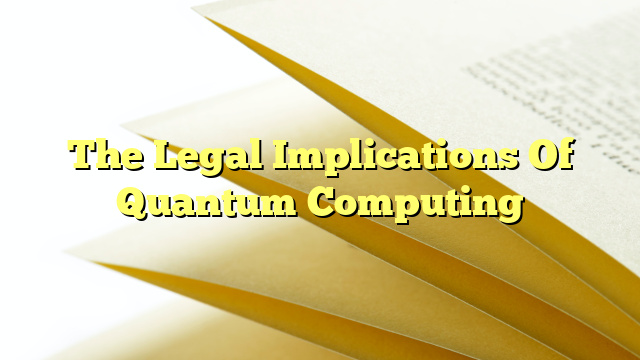What are the implications of quantum computing?
The legal implications of quantum computing are far-reaching and complex. One of the most pressing is the potential for intellectual property theft. With quantum computing, it is possible to crack the codes used to protect sensitive information such as trade secrets, patents, and copyright. This could lead to a whole new wave of cybercrime and corporate espionage, as hackers and malicious actors attempt to gain access to valuable and sensitive information.
Another legal concern is the potential for privacy violations. Quantum computing makes it easier and faster to process large amounts of data, including personal data. This could make it easier for corporations and government entities to collect and store huge amounts of data without any legal oversight. This could lead to an increase in the amount of personal data being collected and stored without the individual’s knowledge or consent, which could be a violation of their right to privacy.
The use of quantum computing for military purposes is also raising legal questions. Quantum computing has the potential to greatly enhance the security of military systems and networks, but it could also be used to hack into and disrupt military systems. The legal implications of this are not yet clear, and will likely take some time to sort out.
What are the ethical concerns of a quantum computing?
As with any new technology, there are ethical concerns about the use of quantum computing. One of the most pressing is the potential for the technology to be used to infringe on the privacy of individuals. Quantum computing makes it easier to process large amounts of data, including private data. This could lead to an increase in the amount of personal data being collected and stored without the individual’s knowledge or consent, which could be a violation of their right to privacy.
Another ethical issue is the potential for quantum computing to be used for military purposes. The technology has the potential to greatly enhance the security of military systems and networks, but it could also be used to hack into and disrupt military systems. This could have grave ethical implications in terms of human rights and international law.
Finally, quantum computing could also be used to create autonomous weapons. These weapons would be able to make decisions without any human input, and could potentially be used to cause great harm. This is a grave ethical concern, and one that will need to be addressed in order to ensure that quantum computing is used responsibly.
What are the laws of quantum computing?
Due to the complexity and novelty of quantum computing, there are currently no laws specifically governing its use. However, existing laws such as copyright, patent, and intellectual property laws are likely to apply to the technology. Additionally, data privacy laws, cybersecurity laws, and export control laws may also be applicable.
Many countries have already started to take steps towards regulating quantum computing. The European Union has proposed a set of regulations for quantum computing development, which are expected to come into effect in 2021. Similarly, the US has established guidelines for the development of quantum computing, and is currently looking into creating a regulatory framework for the technology.
What are the negative impacts of quantum computing?
The potential for quantum computing to be used for criminal and unethical purposes is one of the most pressing negative impacts. Quantum computing is a powerful technology that could be used to hack into and disrupt networks, steal data, and gain access to sensitive information. This could lead to a whole new wave of cybercrime and corporate espionage.
Another negative impact is the potential for quantum computing to be used to infringe on the privacy of individuals. The technology makes it easier to process large amounts of data, including personal data. This could lead to an increase in the amount of personal data being collected and stored without the individual’s knowledge or consent, which could be a violation of their right to privacy.
Finally, quantum computing could be used to create autonomous weapons. These weapons would be able to make decisions without any human input, and could potentially be used to cause great harm. This is a grave ethical concern, and one that must be addressed in order to


Quantum computing presents a flurry of complex legal considerations.
Quantum computing has serious legal implications.